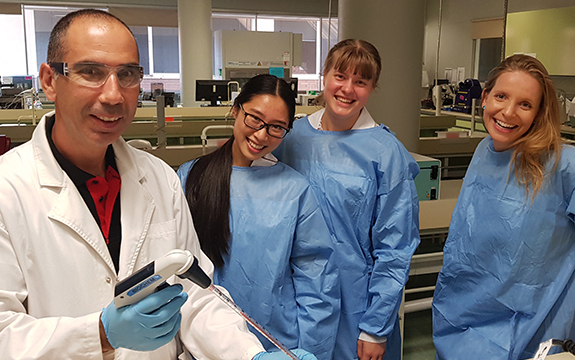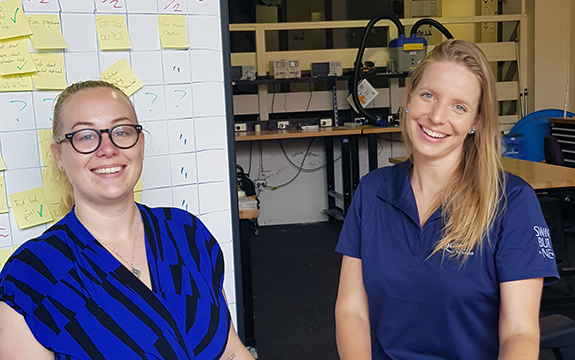Celebrating women and girls in science

In Summary
- Swinburne’s Dr Rebecca Allen works on the SHINE project, which supports Haileybury secondary students to design and send experiments to the International Space Station
- Other outreach activities include working with industry partners to develop capstone projects for Swinburne students and managing Swinburne Astronomy Productions
Celebrated each year on 11 February, the International Day of Women and Girls in Science is a reminder that women and girls play a critical role in science and technology communities and that their participation should be strengthened.
Today we highlight the work of Dr Rebecca Allen, the Space Project Coordinator in Swinburne’s new Space Office.
Dr Allen is working with the Swinburne and Haileybury IN Space Experiment (SHINE), which aims to produce experiments designed and built by Haileybury secondary students, alongside Swinburne mentors, which will then be undertaken on the International Space Station.
Last year the first SHINE experiment was sent into space to help understand how a ‘smart fluid’ acts in microgravity conditions.
“Unfortunately, while the software program developed by the students worked perfectly, during launch the camera was dislodged so the experiment was not able to be conducted as expected,” Dr Allen says.
Tooth decay in space
This year the SHINE team is sending another experiment to NASA to study the effects of microgravity on tooth decay. It will be launched into space in April.
“This year we’re really lucky,” Rebecca says.
“Our Haileybury team is six students and three of them are girls. They’re all very smart, switched-on kids. We also have a PhD student, Sara Webb, from the Centre for Astronomy and Supercomputing, who is working as a mentor with the students alongside three male engineering students.”
 PhD candidate Sara Webb and Dr Rebecca Allen discuss final steps to prepare the SHINE flight module for its trip to the International Space Station.
PhD candidate Sara Webb and Dr Rebecca Allen discuss final steps to prepare the SHINE flight module for its trip to the International Space Station.
SHINE is just one element of Rebecca’s role at Swinburne. As a member of Swinburne’s Space Office, Dr Allen is also working with industry partners to develop capstone projects for Swinburne students that could help those interested in pursuing a career with the new Australian Space Agency.
She is also managing Swinburne Astronomy Productions and running the university’s Astro Tours program.
From USA to Hawthorn
Dr Allen is passionate about astronomy and outreach. She relocated to Australia from the US, where she completed her masters degree at the University of California Riverside, to pursue a PhD in astronomy at Swinburne seven years ago. Since completing her PhD here, she has continued her galaxy research and astronomy outreach activities.
“From a very young age I knew that I wanted to do something to do with space and astronomy. I knew that I wanted to learn as much as I could about it. But along that journey I also realised that I really liked to share what I learned and so teaching and outreach has always been important to me as well,” she says.
“I’ve been really fascinated by how science productions are made, because they really inspire you and they give people access to what’s going on in research, and so I’ve really wanted to try to pursue that.
“I have a passion for sharing my knowledge, and at Swinburne I have been given some amazing opportunities to do so.”
Challenging yourself
Dr Allen’s advice for budding astronomers?
“Whether you know, like I did that I wanted to study astronomy, or whether you’re intimidated by what you think it is going to be is actually nothing like it is. You just have to take that chance to understand if that’s something you really enjoy,” she says.
“Throughout that journey whether you do end up being a researcher or not, you will gain life skills to help you succeed in anything. And yes, there is a lot of math, but there’s nothing wrong with that because math is everywhere. The sooner you embrace it the better!
“Challenging yourself is also part of it – being unafraid to take on challenges even though you might be out of your comfort zone. Because you might also discover something you really enjoy.”

